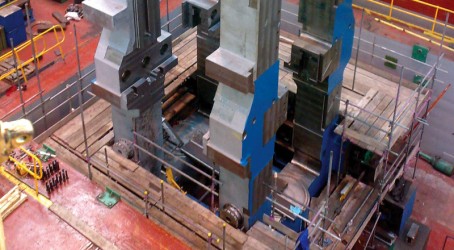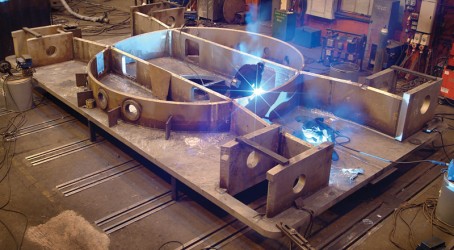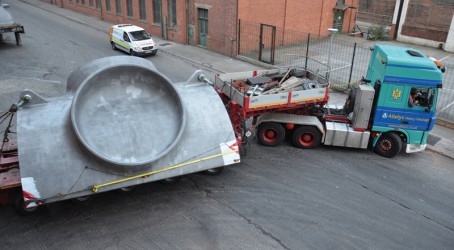Think Sheffield and you think steel. The two are inextricably linked through the city’s rich industrial heritage. But a glorious past is no guarantee of a sustainable future. And Sheffield’s metal industry, like so many other parts of the manufacturing economy, is facing tough times, with fierce competition from rivals in low-cost countries and soaring energy prices at home combining to make life hard.
DavyMarkham, the 190-year-old maker of heavy and complex engineering components and assemblies, illustrates the challenges being faced. The company boasts a wealth of experience at its state-of-the-art facilities to the east of the city that enable it to handle extremely large turnkey projects with individual structures weighing up to 350 tonnes. But while, on the face of it, everything is in place to make the firm a success, DavyMarkham faces a constant battle to stay alive.
“The business has been static for the past half a dozen years, with turnover at around £20-25 million. It has been a very tough period,” admits sales director Gordon Scott.
Two issues combined to make 2012 a particularly arduous year for DavyMarkham. First, the cyclical nature of the heavy engineering sector worked against it. The company does a lot of business in the mining equipment sector, particularly in Canada. Unfortunately a couple of large contracts were cancelled at a late stage, leaving it with big gaps in workflow.
Also, in 2010, DavyMarkham was acquired by Hindustan Dorr-Oliver, one of India’s leading engineering and construction groups. Scott says that the new arrangement took a while to settle down. “We were in the red in 2012, but things have picked up and we will be in the black this year,” he says.
A couple of miles down the road from DavyMarkham is another historic heavy engineering firm, Sheffield Forgemasters, which specialises in a range of forged and cast steel products. Forgemasters is a far larger organisation than DavyMarkham, with turnover at around £110 million and more than 800 employees. But it faces many similar challenges in the diverse range of markets that it serves.
“The business can be up and down,” says chief financial officer Neil Maskrey. “Our toughest year was 2011. We have very long lead times and long procurement cycles in our industry, so the recession hit us later than other sectors.
“It was backs to the wall time, we had to work very hard at managing our cost base through active engagement with our suppliers and by being more efficient by integrating more processes across our businesses.
“Manufacturing is not easy at the best of times. But we are now seeing the benefits in the bottom line.”
International competition is one of the biggest challenges to the business, says Maskrey. Forgemasters was subject to a management buyout in 2005 and around half of the employees have a stake in the business. That makes for a good working environment – the company benefits from an extremely loyal and committed workforce, with low staff turnover.
The flipside, though, is that Forgemasters doesn’t benefit from the backing of a powerful, wealthy parent company, and sometimes that puts it at a disadvantage.
Maskrey says: “Some of our competitors are multiple times bigger than us and they are backed either by global conglomerates or by states. We are wholly owned – and that works very well in that it offers employees the chance to be part of something. But it does create an uneven playing field in that we have to pay our own way. If, say, there was a £10 million problem on a contract, we would have to bail ourselves out.”
The key to Sheffield Forgemasters’ survival is continued investment in people, products and equipment. That enables it to focus on high-quality, complex, engineered solutions for the defence, civil nuclear, oil and gas exploration, power generation, pressure vessel and steel processing industries, rather than competing with lower-cost rivals at the bottom end of the market.


More than £50 million has been spent since the management buyout on new plant, ranging from £15.5 million for “loose tooling”, such as moulds for higher-integrity ingots for the company’s 4,000- and 10,000-tonne presses to create a greater diversity of forged products, through to £2 million spent to overhaul and increase the capacity of cranes in the heavy forge together with full refurbishment of ultra-large furnaces for greater operational efficiencies.
The completion of the new north machine shop at £8.2 million and a 4,000-tonne press costing £9.1 million also form a major part of the investment programme.
The programme is funded by Forgemasters’ continual reinvestment of its entire profits back into the business. “It is a very bold strategy and of course it carries some risk but a reduction in reinvestment is not an option for us,” says Maskrey.
“It is paramount for Forgemasters to keep up with the cutting-edge work of our research and development team in seeking out state-of-the-art engineering solutions and creating new products.”
So how exactly does such an investment-heavy ethos pay dividends? Maskrey points to the company’s success in the oil and gas sector as an example of how that approach has worked. “Oil and gas is booming for us at the moment, and we wouldn’t be reaping those rewards if we hadn’t invested in the business,” he insists.
“Exploration and production offshore is becoming more difficult. It is taking place in deeper water, further offshore, often in worse weather, with an additional emphasis on floating structures.
“Engineering in this sector cannot be done on the cheap. It requires the very best quality, higher value-added, safety-critical castings and forgings. And we are able to meet that standard because of our people and plant.”
The nuclear sector is also an area of special focus within the business, with Sheffield Forgemasters retaining coveted 20-year quality systems certification for civil nuclear forgings and castings after passing an audit by the American Society of Mechanical Engineers (ASME) 3800 Code survey. The ASME code is one of the most comprehensive series of guidelines for civil nuclear manufacture in the world and all other codes, including the French RCC-M code, operate to similar compliance requirements.
The global demand for power is ever increasing and Forgemasters’ work to supply the civil nuclear power industry taps directly into this through its existing relationships with nuclear manufacturers Westinghouse and Areva.
As a result of the audit, Forgemasters is now working towards securing a higher level, ASME NPT accreditation which should allow it to become the only UK producer of the safety-critical heavy forgings and castings that form the heart of a nuclear power plant.
Maskrey says he wishes the government would provide greater clarity on timescales and the structure of the civil nuclear industry. “We would like a definitive statement from the government on where new nuclear is going,” he says.
“We are ready to do business in that sector, we have invested significantly in equipment and processes, and we have got all the necessary accreditation. We want to get going on this.”
That feeds into other areas of energy policy that Maskrey thinks cause problems for companies such as Forgemasters, and indeed DavyMarkham. “Energy costs are a real issue of concern. We are an energy-intensive user with big hungry technologies such as electric arc furnaces. It’s not a cheap business to run. And on top of it we are getting all these green taxes being imposed by the government. It’s an uneven playing field. We have to be really careful that we don’t tax manufacturing out of the UK.”
Despite these issues, Maskrey says there are signs that the government is starting to understand the value of manufacturers to the national economy. He has high praise for the Regional Growth Fund, describing it as exactly the sort of support initiative that manufacturers need. And the money pumped into the Advanced Manufacturing Research Centre in Rotherham is starting to create a high-quality engineering cluster in the region, focusing on excellence.
“So there are reasons to be optimistic,” he says. “As a company, we have faith in our strategy, and all the signs are that we have got it right. Manufacturing is difficult here, but then it’s difficult anywhere. We need to stay sharp, stay true to our core values, and keep investing in the future.”


Back down the road at DavyMarkham, there is also room for optimism. Gordon Scott says that this year is shaping up well, with the company forging a strong relationship with Rolls-Royce for the manufacture of a series of test rigs for the Astute range of submarines. DavyMarkham has also been busy producing test rigs for the National Renewable Energy Centre in Blyth, Northumberland, and the nuclear decommissioning sector continues to provide a steady stream of opportunities. “We have also won work through our Indian owner. So, overall, there is now a bit of forward visibility for the business,” he says.
There is also a strong focus on developing overseas markets, with countries such as Peru providing a lot of business related to mining activities. “We spotted an opportunity in Peru a couple of years ago, and that has proved very worthwhile,” says Scott.
“The key to international markets is to do your homework. We did a lot of analysis on competitors, and then we got UK Trade and Investment to help us put together a list of possible agents. We then went out there to interview candidates before selecting an agent who we felt suited us the best. They have been very active for us ever since.”
Interestingly, Scott says that being a British company provides distinct benefits. He says that British engineering is still very well-respected, especially in South America. “It is a hard world out there, but being British can make a difference. There are many Anglophiles out there.”
Overall, then, DavyMarkham, like Sheffield Forgemasters, continues to battle against the odds to ensure that it is successful in the long term and that the city remains home to heavy engineering expertise.
“It is hard to be a manufacturer,” says Scott. “It would have been easy just to become a project office. But we are proud to be a company who can design, build, install and commission structures.
“We are quoting in Canada, Peru, Mexico, the North Sea – we are still extremely active. Also, as a firm, we are very enthusiastic, and that comes down to the fact that we love what we do.”

Casting made to withstand battering from the sea
The skills and capabilities of Sheffield Forgemasters were illustrated earlier this year with a multi-million pound package of work for crucial components to upgrade a subsea structure at the Siri oil platform in the middle of the North Sea.
The main work was for a 114-tonne clamp casting for the Siri Caisson Permanent Support project on the Danish continental shelf. The 6m-long and 2.8m-radius casting will form part of a clamp connection to the existing substructure which will be braced to offer a permanent engineering solution.
Forgemasters will also make 35 flange and spacer castings for the second phase of construction on the project for Dong Exploration and Production. Ian Nicholls, managing director of Vulcan SFM, Forgemasters’ specialist subsidiary for bespoke products for offshore oil and gas, says: “Our particular expertise is in high-integrity steel castings and forgings for this sector. The operating conditions for this clamp mean that high fatigue resistance is critical to the successful operation.
“Castings offer the ideal solution for this type of situation, but the quality of the component is extremely important. Using the known properties of fracture toughness for the cast material and the extreme loading scenarios for the operational conditions, a critical assessment was carried out to determine high-quality standards.”
The extreme size and shape of the casting meant that an understanding of the dimensional changes that can take place was vital to a successful manufacturing effort. RD26, Forgemasters’ new research and development subsidiary, carried out computer simulations of expansions and contractions through cooling after casting and through heat treatment, and provided information for the production.
The cast material was developed by Forgemasters specifically for this type of operation, combining strength, toughness and weldability. Vulcan and Wilton Engineering, which fabricated the final assembly, are co-operating on a new range of weldability tests that will extend the weld thickness. Vulcan also worked closely with Subsea 7 which performed critical assessments to determine the appropriate non-destructive testing requirements for the clamp.